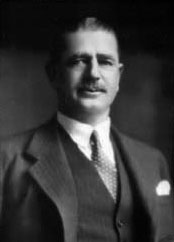Joseph Gordon Coates

Joseph Gordon (Gordon) Coates was born on 3 February 1878, one of seven children. Coates was educated for several years at the small Matakohe School, but was said to be ‘no scholar’. Gordon and his brother, Rodney, later ran the family farm, as his father was a manic depressant and unable to do so.
In 1890 Coates joined the Otamatea Mounted Rifle Volunteers, and later led them. When, following his father’s death, he transferred to the reserve of officers, and was able to stand for the Otamatea County Council. From 1913 to 1916, Coates was the chairman of the Council.
Coates won the parliamentary seat of Kaipara on the second ballot on 14 December 1911. He was to represent the seat until his death. Coates entered Parliament as an independent Liberal, and voted to support Joseph Ward and the liberals, helping them to hold power by a very slim margin. He was therefore offered a ministerial position in the Liberal ministry under Thomas MacKenzie, but declined the offer. In 1912 Coates was voted again with the winning team, giving Massey’s Reform Party his vote of confidence. By 1914 he had joined the Reform Party and was their official candidate for Kaipara.
When war broke out in 1914, Coates enlisted and was keen to go to the front. He left for France with the infantry’s 19th Reinforcements to the New Zealand Expeditionary Force in November 1916, and was later posted as second in command of the 15th (North Auckland) Company of the 1st Battalion of the Auckland Infantry Regiment. During his time at war he won a Military Cross at La Basseville.
Coates arrived back in New Zealand in May 1919, and returned to the Kaipara electorate. In August 1919 Massey reconstructed his ministry, and on 2 September Coates accepted the positions of minister of justice, postmaster general, and minister of telegraphs. After being re-elected in 1919 Coates was made minister of public works and later minister of railways. In 1921 Coates also became Native minister, a role he held until December 1928.
By 1925 Coates had been singled out as the natural successor to Massey, whose health was ailing. When Massey did die, Bell temporarily became Prime Minister, and then Coates took over, being sworn in on 30 May 1925.
At the polls on 14 November 1927, Coate’s government suffered severely. He called parliament and was defeated on a motion of no confidence. Ward took office and Coates became leader of the opposition. It was the first time since entering Parliament 17 years earlier that Coates had not been a part of the government of the day. When Ward resigned in May 1930, Forbes and Coates struck a deal, and Coates subsequently took office again as minister of public works and minister of transport. This coalition retained power in the election on 2 December 1931, but in 1935 suffered a humiliating seat, Coates almost losing his Kaipara seat. Again, in 1942 Coates once again became a minister, this time as minister of armed forces and war co-ordination in the War Administration.
At the time of his death, Coates was preparing to stand again in Parliament as an independent National Candidate. However a strenuous workload and a lifetime of heavy smoking caught up with him, and he collapsed and died in his Wellington office on the afternoon of 27 May 1943. Coates had married Marguerite Coles in 1914, and had five daughters.
Document Actions

 Like us on Facebook
Like us on Facebook